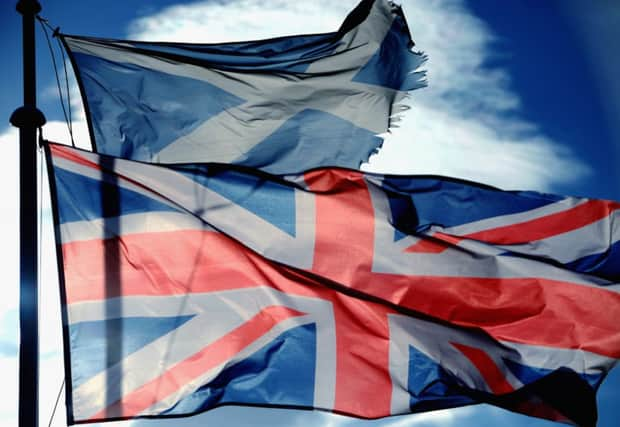rUK businesses urge Scotland to remain in Union


In a poll of almost 2,400 members in England, Wales and Northern Ireland, 85% said they thought Scotland should stay part of the UK and 11% said Scotland should become an independent country.
Respondents identified future currency arrangements as the most important issue for their business, with over a third (35%) of businesses stating a formal currency union would be in the best interests of the UK if Scotland became independent.
Advertisement
Hide AdAdvertisement
Hide AdMore than a quarter (28%) said Scotland should create its own currency if it votes for independence and 18% said it should join the euro.
The survey follows research by the Scottish Chambers of Commerce (SCC) published last week which found 8% of firms had definite plans to move away from Scotland if it voted to leave the UK, while a further 10% said they were considering a move.
In the BCC survey, 91% of businesses outside Scotland said the independence debate has had no impact on business decisions to date.
The research saw 11% of firms report that the debate was having a negative impact on orders and sales, compared with 5% in August last year.
BCC director general John Longworth said: “Businesses in England, Wales and Northern Ireland remain less than captivated by the intense debate unfolding north of the border. Yet they do have views on the potential impacts of a change in Scotland’s relationship with the rest of the UK.
“In the event of a Yes vote, cross-border trading and currency arrangements loom large in businesses’ thinking. If Scotland votes No, constitutional questions remain around the devolution of power and the distribution of public funding between nations.
“Business communities across the UK have diverse views on the Scottish independence debate. Yet one thing is for certain. Regardless of how Scotland votes in September, things will never be quite the same again.”
The BCC said 2,381 businesses based in England, Wales and Northern Ireland responded to its survey between April 14 and 17.
‘Business case’
Advertisement
Hide AdAdvertisement
Hide AdUK Business Secretary Vince Cable said: “The business case for the union is rock solid. Firms throughout the UK benefit from shared infrastructure, employment law, investment in new technologies and the free movement of goods and labour.
“With integration working for large and small employers, from the creative industries to advanced engineering to financial services, it is no surprise that businesses want Scotland to remain part of the UK.
“Breaking up this partnership could mean more red tape, higher costs and damaging levels of uncertainty for companies everywhere in Britain. As trade between Scotland and the rest of the UK continues to increase, businesses know that it makes sense for us to work together, not create new barriers to employment and growth.”
Labour MP and shadow business minister Ian Murray said that “breaking-up” the UK would create huge risks and cost jobs in Scotland, while the Scottish Conservatives’ Murdo Fraser said the threat of separation was causing “extreme tension” among employers in Scotland.
Mr Fraser said: “What is now becoming clear is it’s a headache for the vast majority of businesses in the rest of the UK too. They don’t want to break apart a system that works very well, and these are the people who know best.”
Business for Scotland response
But Tony Banks, chairman of the pro-independence group Business for Scotland, said: “People who run businesses are not fools. They know, as I myself know, that an independent Scotland will give Scotland the brand a far greater opportunity to make its mark globally and to promote its goods and services across the world.”
Almost two thirds (63%) of businesses told the BCC they favour reforms to the current arrangements for allocating public expenditure between the UK nations in the event of a No vote.
The SNP said this underlined the need for a Yes vote “to ensure that Scotland can protect its budget”.
Advertisement
Hide AdAdvertisement
Hide AdTreasury spokesman Stewart Hosie said: “On top of unprecedented cuts we’ve already seen, senior figures at Westminster are committed to slashing another £4 billion from Scotland’s public services - and this survey finds that businesses outside Scotland would pile further pressure onto the UK Government to do this.
“Businesses also stated that the referendum debate has had no impact on their business decisions - this blows away No camp attempts to scaremonger to the contrary. The biggest threat to UK business is Westminster’s obsession with a referendum on EU membership that could see us ripped out of the European Union.”
On a currency union, he added: “Businesses elsewhere in the UK know a refusal to share Sterling would see businesses south of the border faced with an extra £500 million in transaction costs. The inescapable truth is that a currency union is in the interests of Scotland and the rest of the UK.”